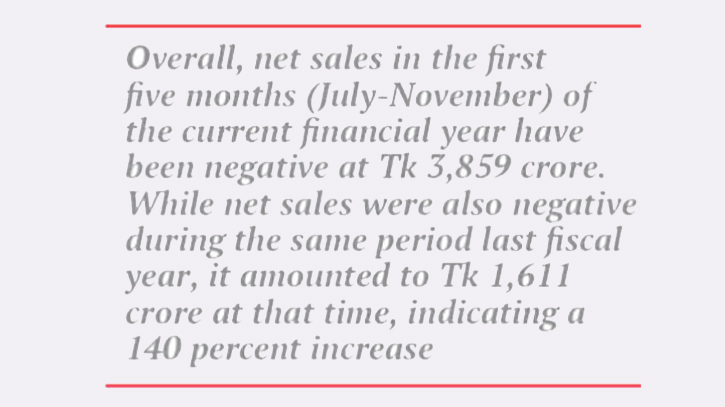
Photo : Collected
While the net sales of savings bonds were positive in the first two months of the current financial year, the subsequent three months saw a reversal with negative figures. This implies that, over the last three months, there has been a growing trend of selling savings bonds rather than purchasing them. Consequently, net sales (investment) have been negative for the past three months.
In last November, net investment (sales) was negative at Tk 1,554 crore. The previous month also recorded net sales being negative by more than Tk 1,000 crore. In September, the negative figure was Tk 147 crore. However, in the initial two months of the financial year (July-August), net investment in savings bonds witnessed a significant increase due to a low redemption trend, with net sales being positive at Tk 5,562 crore.
Overall, net sales in the first five months (July-November) of the current financial year have been negative at Tk 3,859 crore. While net sales were also negative during the same period last fiscal year, it amounted to Tk 1,611 crore at that time, indicating a 140 percent increase.
The government has set a net borrowing target from savings bonds in the current financial year at Tk 18,000 crore. The unchecked rise in the prices of goods and services has escalated the cost of living, impacting savings, especially for those on fixed incomes. Many individuals are depleting their savings accounts, and despite various measures, some have refrained from investing in savings bonds. Consequently, sales in this sector are not increasing as expected.
Various savings card schemes cater to the lower-middle class, individuals with limited income, women, disabled individuals, and retired officers and employees. The government offers comparatively higher profits (interest) on savings bonds, considering social security. However, due to various reasons, including austerity measures, the sale of savings bonds collapsed in 7 out of the 12 months of the last financial year.
However, net sales increased considerably in the first two months of the current financial year. This surge is attributed to the fact that the amount redeemed was significantly less than the value of savings bonds sold during that period. The remaining amount after the original payment for redeeming the savings bonds sold earlier (on or before maturity) is referred to as net sales, which is considered either borrowing or lending by the government.
The net borrowing target from the sale of savings bonds for the last financial year was set at Tk 35,000 crore. However, due to declining sales, this target was revised to Tk 32,000 crore. At the end of the fiscal year, however, net sales stood at a negative Tk 3,295 crore.
In essence, throughout the entire last financial year, the total sale of savings certificates was Tk 80,858 crore. Concurrently, the redemption of savings bonds amounted to Tk 84,153 crore. This implies that the government did not receive a single taka loan from this sector throughout the financial year. Notably, the trend of selling fewer savings bonds than the ones redeemed has been increasing since September of the previous year.
In the financial year 2021-22, the government received relatively fewer loans from savings bonds, with net debt for the entire financial year reaching Tk 19,915 crore against the target of Tk 32,000 crore. Despite the impact of Covid, the net investment in savings bonds in the financial year 2020-21 was approximately Tk 42,000 crore, significantly higher than the Tk 14,428 crore recorded in its preceding fiscal year.
As of November, the government's savings bond debt stood at Tk 363,535 crore. According to the Bangladesh Bank report, the cumulative domestic source debt of the government was Tk 705,373 crore in October 2022, increasing to Tk 809,918 crore in the same month of 2023. The accumulated debt of the government from banks stands at Tk 382,609 crore, with the amount of accumulated loans taken from the non-banking sector standing at Tk 427,309 crore.
Messenger/Fameema








